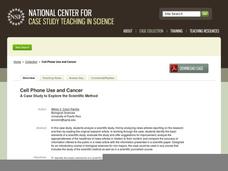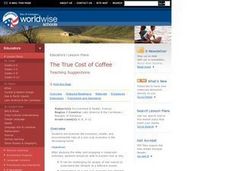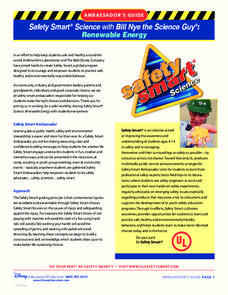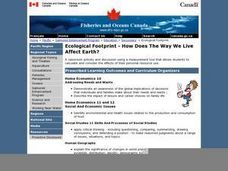Curated OER
Food Systems Feed the World
Sixth graders consider the source of their nutrition. In this food systems lesson, 6th graders discuss how food gets to the table and the process it goes through. Students reflect on world hunger issues, farming, and consumerism through...
Curated OER
Breads Around the World
Sixth graders explore world cultures by researching dietary habits. In this bread identification lesson, 6th graders explore different regions around the world and the types of breads they produce. Students read assigned text about the...
Baylor College
Modeling an HIV Particle
Models are an important part of science; they help us see the world on a scale that works for us. In the first of five lessons on HIV, learners make a paper model of the HIV virus that is about 500,000 times larger than the actual virus....
Curated OER
Dental Impressions
What an impressive task it is to make dental impressions! Pupils learn how dentists use proportional reasoning, unit conversions, and systems of equations to estimate the materials needed to make stone models of dental impressions....
Baylor College
Water: Post-Assessment
Very simply, the science class will discuss what they have learned during The Science of Water unit and take a multiple-choice post-assessment quiz. A few other closing activities are suggested for you to choose from, such as having...
National Center for Case Study Teaching in Science
Cell Phone Use and Cancer
The cell phone you're using is making you deaf: news at 11:00. Oftentimes, the media uses fear tactics and other techniques to increase its audience base. In an intriguing look at the difference between scientific journals and...
Baylor College
How Do We Use Water?
Send youngsters home to survey how they use water in their homes. Then bring them together to discuss which uses are essential for our health and which are not. A helpful video offers teaching tips for this lesson, and a presentation...
Curated OER
The Brain’s Inner Workings
Do you want to learn about how you learn? Help pupils become the best learners they can be by teaching them how their brain works. The resources available include videos about brain structure and a study guide full of activities that...
Kenan Fellows
The Little Stuff Can Make a Big Difference
Great things come in small packages! What better way to illustrate this point than a week-long look at nanotechnology? Earth science scholars explore water quality issues through lab activities, then research new innovations in nanotech...
Curated OER
The True Cost of Coffee
Students examine the economic, health and environmental risks of being a one-crop country. They explain the risks of relying on one crop. They also identify the factors that resist change.
Curated OER
The East Fork Project
Students identify possible sources of health risks, types of exposures, routes of exposure, and populations that could be affected after discussing water pollution and environmental health hazards. After discussion, students conduct a...
Polar Bears International
Taking Action!
Motivate young scientists to stand up and take action with this environmental science instructional activity. To begin, the class works in small groups brainstorming actions that support the conservation of the earth before creating and...
Out-of-School Time Resource Center
Nutrition and Physical Activity
Emerging nutritionists explore what it means to be healthy. In the beginning of the unit, your class will examine the five food groups and learn how food gets from the farm to our plates. This leads into the investigation of...
Disney
Renewable Energy
Bring some energy to your physical science curriculum with this engaging Bill Nye the Science Guy instructional activity. Based on his Renewable Energy video, students explore the concepts of potential and kinetic energy and learn how...
NOAA
Off Base
How does carbon dioxide affect the world's oceans? The final installment in a series of six lessons has pupils research ocean acidification, then conduct an experiment to witness the delicate balance that exists in our seas. Materials...
Curated OER
Bromine: An Important Arkansas Industry
Arkansas ranks first in the entire world in the production of bromine! Here is a lesson which guides middle schoolers through a study about the formation and history of Arkansas' bromine reserves. They also looks at the many uses of...
Baylor College
Why Is Water Important? Pre-assessment
This water worksheet is just the tip of the iceberg! It a multiple-choice quiz meant to be a pre-assessment for a wonderful water unit. There are 10 questions to be answered regarding the role, properties, and behavior of water. Make...
Baylor College
How Much Water Do Humans Need?
Physical or life science learners measure the amounts of water eliminated by intestines and the urinary system, and the amounts lost via respiration and perspiration. In doing so, they discover that the body's water must be replenished...
Baylor College
Plant Parts You Eat
Plants provide a variety of delicious foods essential for human survival. In the fourth lesson of this series on food science, young scientists investigate common fruits, vegetables, and grains in order to determine which plant part is...
Baylor College
Bio Build-up
Trace pollutants through the environment in the seventh lesson of this series on the science of food. Looking at a picture of the plants and animals in an aquatic ecosystem, learners use dot stickers to represent harmful chemicals as...
Baylor College
What's That Food?
Get things cooking with the first lesson in this series on the science of food. Working in small groups, young scientists make and record observations about different mystery foods. These descriptions are then shared with the class and...
Baylor College
Healthy Snacks
Assess your pupils' ability to identify healthy food choices in the final lesson of this series on food science. Given five different food labels, young nutritionists will rank them from most to least healthy, supporting their choices...
Baylor College
Using Food Labels
Help your class make sense of nutrition labels with the ninth lesson of this series. After explaining the different information provided on packaged food labels, perform an activity that demonstrates the amount of sugar in a single can...
Curated OER
Ecological Footprint--How Does The Way We Live Affect Earth?
Learners demonstrate an awareness of the global implications of decisions that individuals and families make about their needs and wants. They identify environmental and health issues related to the production and consumption of food....

























